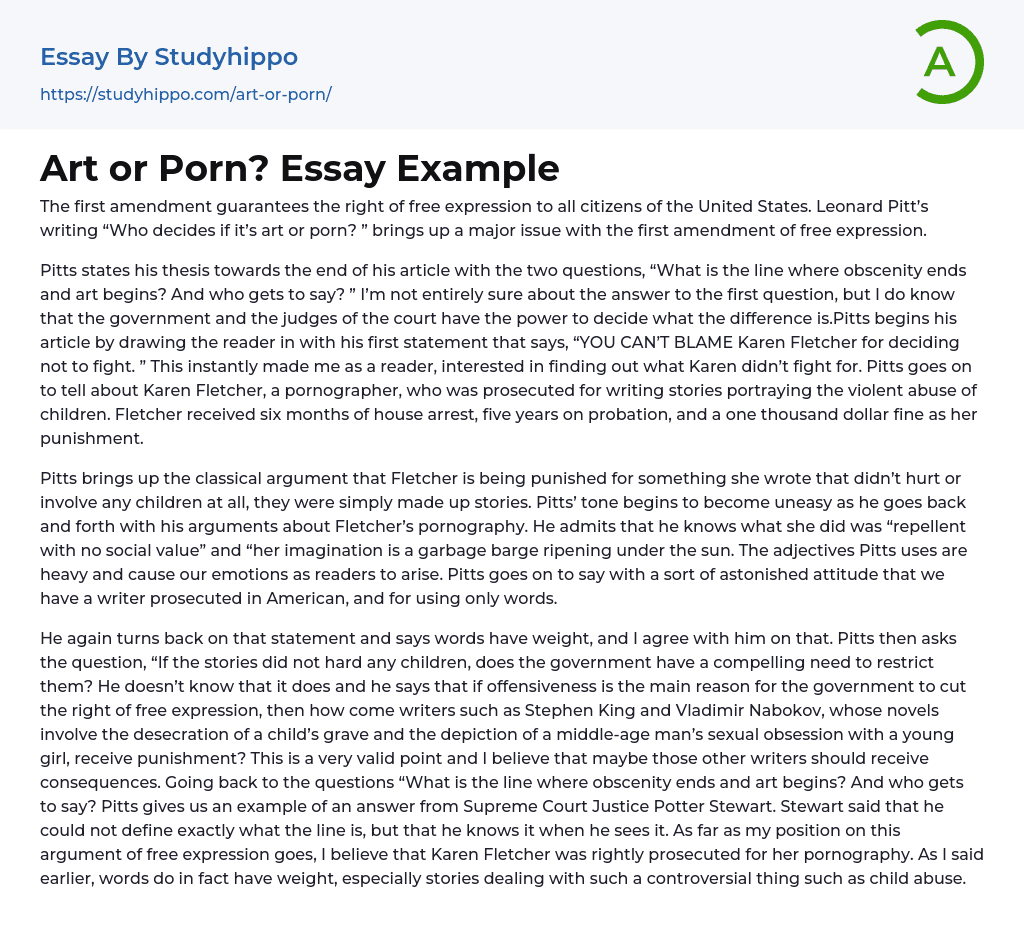Leonard Pitt raises a significant concern about the protection of free expression guaranteed to all US citizens by the first amendment in his article titled "Who decides if it's art or porn?"
In his article, Pitts poses two essential questions: "What is the line that separates obscenity from art?" and "Who has the authority to determine it?" The government and courts hold significant influence in this matter, although I am uncertain of the answer to the first question. Pitts grabs readers' attention by stating that "YOU CAN'T BLAME Karen Fletcher for deciding not to fight." This statement sparks interest in what Karen chose not to contest. He then recounts the story of Karen Fletcher, who was prosecuted for creating fictional stories depicting minors being brutally abused. She received a sentence of half a year of house arrest, five years' probation, an
...d a one-thousand dollar fine.In his discussion, Pitts raises the conventional point that Fletcher is being punished for her fictional writing that did not harm or involve any minors. As he debates Fletcher's pornography, Pitts' tone becomes uneasy, admitting that her actions are "repulsive with no societal merits" and labeling her imagination as a "garbage barge ripening under the sun." His choice of words creates an emotional response in readers. In astounded disbelief, Pitts notes that a writer is being prosecuted in America simply for their use of language.
Agreeing with a previous statement, the speaker emphasizes the importance of words carrying weight. In response to the question of whether the government has the right to restrict stories that do not harm children, the speaker questions why offensive stories from writers like Stephen King and Vladimi
Nabokov are not punished despite their controversial content. The issue of defining obscenity and art is brought up, with Supreme Court Justice Potter Stewart's famous claim that he knows it when he sees it. Personally, the speaker believes that pornography involving child abuse, like that produced by Karen Fletcher, should be prosecuted as words can have a significant impact.
While Fletcher’s stories may not have physically harmed any children, the potential harm they can cause through twisted interpretations is a concern. Pitts’ assertion that Fletcher’s works are not missed is valid since her stories promote the heinous acts of child rape, torture, and murder. These actions are illegal in the United States and carry no redeeming value. From my perspective, Fletcher’s stories lack artistic merit and are simply nonsensical.
While discussing the prosecution of Fletcher, I am not convinced by Pitts' argument that it was unwarranted. The matter of where the line between obscenity and art is drawn, and who holds the power to decide this, remains unaddressed in his viewpoint. Pitts only responds to whether or not the government should limit such content. He ultimately expresses mistrust towards the government's capability to distinguish between obscenity and art. As for Fletcher's rights to freedom of expression as a citizen being violated through her prosecution, if she genuinely believed this to be true, why did she not resist?
- Abuse Support essays
- Child Abuse essays
- Alcohol Abuse essays
- Physical Abuse essays
- Sexual Abuse essays
- Substance Abuse essays
- Abortion essays
- Abuse essays
- Animal Rights essays
- Animal Testing essays
- Assault essays
- Bullying essays
- Controversial Issue essays
- Crash essays
- Cyber Bullying essays
- Feminism essays
- Human Rights essays
- Immigration essays
- Inequality essays
- Poverty essays
- Prejudice essays
- Racism essays
- Torture essays
- Violence essays
- John Locke essays
- 9/11 essays
- A Good Teacher essays
- A Healthy Diet essays
- A Modest Proposal essays
- A&P essays
- Academic Achievement essays
- Achievement essays
- Achieving goals essays
- Admission essays
- Advantages And Disadvantages Of Internet essays
- Alcoholic drinks essays
- Ammonia essays
- Analytical essays
- Ancient Olympic Games essays
- APA essays
- Arabian Peninsula essays
- Argument essays
- Argumentative essays
- Art essays
- Atlantic Ocean essays
- Auto-ethnography essays
- Autobiography essays
- Ballad essays
- Batman essays
- Binge Eating essays




